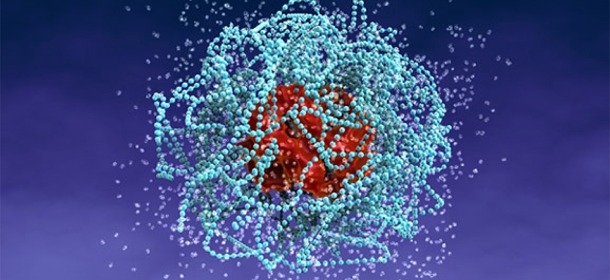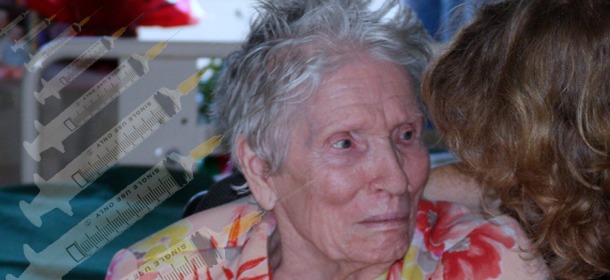Featured
New Name for Artificial Blood, Still No Patient Consent in Trials
New artificial blood trials are being done, in spite of disastrous ones a few years ago. Now, though, they’ve given the product a new name—but the subjects are still treated as lab rats with no awareness of what’s being done. Testing HQ is now in the UK.

Sangart’s graphic of MP4OX, which has nothing to do with how it actually looks. It’s just pretty and a good marketing tool.
by Heidi Stevenson
A new method is now being used to push trials of artificial blood, a product that has clearly been shown to do far more harm than is conscionable. The approach is simplicity itself: Rename it and run the trials in a different country. Don’t call it artificial blood—call it a blood booster! Don’t run the trials in the US, where at least 16 have resulted in 30% more dying than when a placebo is used1. Get another country to do it, in this case, the UK.
Gaia Health published information about this scandal years ago in Artificial Blood Kills, But Trials Continue Without Patient Consent. The UK is testing it on its own people and those of other countries, The product is being used on human guinea pigs without their knowledge or consent and it’s one of those that were discredited years ago. At the time, it went under the name of Hemospan. Now it’s called by a more technical-sounding name, MP4OX (em pee 4 oh eks). But it’s exactly the same product.
Running the Trial in the UK
The Royal London Hospital is leading the now-ongoing trial. The trial’s leader, Professor Karim Brohi, told BBC2:
We’re giving it to people who been severely injured in car crashes, have fallen out of a window, been stabbed etc.
Basically it’s a drug which takes up oxygen and delivers it to cells which are starved of oxygen because there’s not enough blood going around the body.
That’s his claim, anyway. But the fact is that trials for artificial blood—now called blood booster—have had dismal results. In this case, the BBC reports only that there has been a single small pilot trial, which “appeared to show the drug was safe”.
But that’s not the whole truth. There have been at least two other trials of the product, neither of which fits the description of 50 patients. One of those trials, in fact, wasn’t published3. Big Pharma corporations publish any trial that can be spun to give the impression of effectiveness and safety, but they didn’t publish that one. You can make up your own mind about what that implies. The other trial compares Hemospan with another product, not a placebo, and the comparison was not entirely positive4.
Brohi says that MP4OX shouldn’t be called artificial blood—though that’s how it was originally billed. He says1:
This isn’t a substitute for blood because we give less than a Coke can’s worth to each patient – while these patients may have lost up to five litres of blood – so in no way is it a substitute for giving red blood cells to patients. What it’s doing is augmenting the ability of those red blood cells to do their job.
In a typical manner, BBC just went along with what they were told, so they referred to MP4OX as a “blood booster”. Clearly, they didn’t bother to look into this product’s history or that of similar ones, nor did they bother to see what sort of trial would be run, as they didn’t note that not only will patients not be given informed choice, they won’t get any choice!
MP4OX: What Is It?
MP4OX is made from “expired blood stocks”. They don’t tell us where they get the stuff, but one imagines that it must come from places like hospitals that stock it for transfusions or from blood donation centers. Right now, when it reaches the expiration date, they must dispose of it safely, which can be costly. Soon, though, they have a market for selling it.
The expired blood is purified, The hemoglobin is separated out and put through a process of polymerization, which results in super-sized hemoglobin molecules. That is, they are combined to form large multi-hemoglobin molecules. Polyethylene glycol (PEG) is used in this polymerization process called PEGylation to form connections between the hemoglobin molecules.
PEG metabolites have been shown to cause liver toxicity in at least one study5. Obviously, PEG used in MP4OX will be broken down, that is, it will be metabolized, by the body. We, therefore, have good reason to suspect that it will cause liver damage, though PEG is often billed as nontoxic.
Polymerized PEG-hemoglobin molecules are claimed to be safer than other forms of synthetic blood. However, Sangart doesn’t explain why it’s safe in their product, but was bad in another, Northfield Laboratories’ PolyHeme. Northfield is now out of business because not even the FDA would approve it, as its safety profile was poor. So, MP4OX is being described as safe, when a former competitor’s product, using much the same technology6, most assuredly was not.
It’s acknowledged that the pilot trial referenced by the BBC’s report wasn’t terribly impressive. Brohi, the leader of the Royal London’s trial says only:
In the initial trial, it seemed to show that people got out of hospital much quicker than patients who hadn’t had the drug. It was a small trial with lots of room for error, but there was a pretty strong signal that there were a lot more patients who were alive and out of hospital at 28 days compared to the ones who hadn’t had the drug.
On the basis of a single pilot that apparently had rather limited results and had “lots of room for error”—along with an unpublished trial that shows who-knows-what—a large, multi-country trial is now in progress to see if, perhaps, maybe, by some chance MP4OX will have better results than the placebo.
Continuing Attempts to Get Artificial Blood on the Market
The Royal London Hospital trial is being done directly for Polyheme’s manufacturer, Sangart. So, we not only have a trial being done without the patients even knowing that they’re guinea pigs, it’s being done at the behest of the company that hopes to profit from the public, and it’s being done after a massive string of trials of similar products has failed abysmally.
The goal appears to be to get this product on the market, whatever it takes. Not only the corporation that hopes to profit pushes it, we’re also seeing regulating agencies involved in the process. The FDA keeps approving trials, and though Gaia Health’s previous report references a study that investigated studies up to the year 2007, others have been done since. As that report states, the FDA decided that future studies should be done only on patients who weren’t expected to live.
Now, though, the current study being done at Sangart’s behest plans to use trauma patients who are expected to survive. To summarize, here’s what’s going against MP4OX right now:
- It’s much the same as another earlier product that the FDA refused to approve because it wasn’t safe.
- The only trial of the product referenced in justifying the current one is acknowledged to be inferior.
- Blood substitutes based on hemoglobin, like MP4OX, were demonstrated to be dangerous, resulting in 30% more deaths than placebo.
- The people who are or will be subjects of the trial are not informed. This runs completely counter to all law and is obviously inhumane.
Sadly, though, the modern system of medicine has completely lost its bearings. Running trials on unwitting people—no problem. Running trials until you finally get a positive result, and then ignoring all previous ones? No problem. When too many trials prove to have bad results and the public gets wind of it? Just change the name of the product and move the testing outside the country.
This is the nature of our medical system today. It has completely lost its moral compass. What it knows best is lying and covering up. The current testing of an already-failed product on unknowing people makes it clear. Modern medicine exists primarily to line a few extremely wealthy pockets, and the cost borne by the rest of us is never too high.
Sources:
- Journal of the American Medical Association, Cell-Free Hemoglobin-Based Blood Substitutes and Risk of Myocardial Infarction and Death, Charles Natanson, MD, et al.
- New blood ‘booster’ tested in UK-led clinical trials
- Phase III Study of Hemospan® for Treating Hypotension in Hip Arthroplasty
- A Multicenter Clinical Study of the Safety and Activity of Maleimide-Polyethylene Glycol–modified Hemoglobin (Hemospan®) in Patients Undergoing Major Orthopedic Surgery
- Toxicity of topical polyethylene glycol
- PolyHeme®
- Phase IIb Study of MP4OX in Traumatic Hemorrhagic Shock Patients, registration of UK’s international artificial blood trial
Tagged artificial blood, big pharma, conventional medicine, evidence-based medicine, hemospan, modern medicine, mp4ox, mp4ox hemospan, mp4ox royal london hospital, mp4ox trial, mp4ox trial uk, pharmaceutical drugs, pharmaceuticals, pseudo-science, pseudoscience, royal london hospital artificial blood trial, royal london hospital trial, sangart hemospan, sangart mp4ox, science
Related Posts
-
DebbyBruck
-
http://www.facebook.com/people/David-Salter/620346940 David Salter













